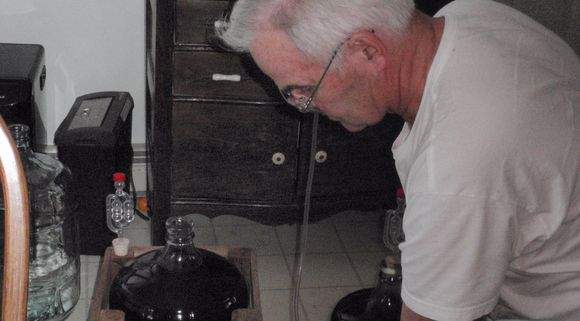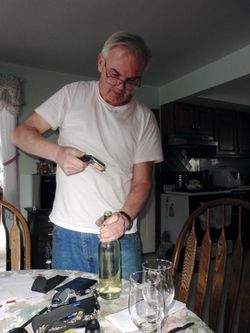
By Julia Burke, Niagara Escarpment Correspondent
 “I learned from the school of hard knocks,” chuckles Don
“I learned from the school of hard knocks,” chuckles Don
Demaison when I ask him about his viticulture education. It’s no joke – after
purchasing a farm with a vineyard full of hybrid and native vines, trying to
make it as a commercial grower, and ultimately selling the farm only to buy it
back and convert it to a vinifera-only vineyard, Demaison’s journey has not
been easy.
Taste his wine, however, and it’s clear his extensive experience has
paid off: he’s producing excellent fruit for his own use and for other Niagara
winemakers, and the resulting wines are remarkable.
Demaison had an early start in viticulture; he grew up on
the Niagara Escarpment and spent his childhood helping his father in their
concord vineyard. Yet he recalls purchasing his farm on Lower Mountain Road
almost as a whim: “There were vineyards there, and I just dove right in!”
When
he bought the farm in 1970 there were seventeen acres of French and American
hybrids such as chancellor, concord and seyval. Demaison expanded the existing
vineyard, added additional additional acreage on three other sites in the area,
and began selling his grapes to Welch’s and Taylor.
Disaster struck shortly after. “In early ‘80s, Taylor
cancelled all their contracts, and the markets went into a tailspin,” Demaison
recalls. Prices plummeted within two years. In overwhelming debt, he filed
bankruptcy and sold the farm. “I hit rock bottom,” he remembers.
Demaison had all but given up on wine, though he bought back
the farm in 1991. “I’ve proved I love this farm – I bought it twice!” he
laughs. Still, he had no intention of resuming work on the vineyard. “When I
moved back I said I never wanted to look at another grape vine as long as I
lived,” he says. “My dreams were shattered. But I watched Mike (Von Heckler, of
Warm Lake Estate), and I worked there for a summer, and he asked, “how would
you like to run the vineyard for me?”
Demaison mentioned the idea to his wife
Judy. “She said, ‘You like what you’re doing – why don’t you do it?’ And I did
– and it rekindled that old flame that I had suppressed.”
Demaison wanted to start afresh with a clean slate – and in
2005, in a move that could be seen as a dramatic metaphor for the future of the
Niagara region, he took a cutthroat approach to the languishing vineyard of
hybrids and natives. “I brought in a bulldozer and pushed everything out, and
last year I buried the piles.” Demaison planted a new vineyard more suited to
his taste.
“There’s riesling, pinot gris, pinot noir, sauvignon blanc,
and blaufrankisch,” he says. “It’s
about an acre of each, which will average 2.5 tons, giving me about seven to ten
thousand bottles a year. Which, I think, is good for me!”
Demaison’s new vineyard proved a crash course in a whole new
set of challenges.
“Growing vinifera isn’t like growing hybrids,” he says. “The mildew and the
rots can be difficult, but there’s a lot of good materials out there now to
control disease.” When deciding what to plant, Demaison deliberately focused on
Alsatian varietals (he’s of Alsatian descent) which can withstand cold
weather.
He made an exception for one varietal. “I just like
sauvignon blanc!” he says. “It’s distinctive. I planted 400 vines -- that way if it doesn’t work, I’m not
going to break the bank.” Demaison took special measures this year to protect
the vines from a harsh winter. “I did a lot of work on those – I took them down
off the trellis, laid them down, covered them with straw lightly, and now
they’re under a blanket of snow. They’re just as snug as a bug in a rug!”
After years of learning vineyard techniques the hard way,
Demaison’s experience is paying off, and local winemakers are reaping the
benefits.
“Last year was a really tough year, and I had a beautiful crop of
grapes – just ask Duncan (Ross, at Arrowhead Spring), Jonathan (Oakes, at
Leonard Oakes), or Randy (Biehl, at Eveningside).” These wineries have made
wine using Demaison’s grapes, with excellent results.
I was lucky enough to
taste a tank sample of 2009 Sauvignon Blanc from Demaison’s grapes at
Eveningside Vineyards recently, and during the interview I remarked to him how
impressed I was with the aromatics and acidity. “You like sauvignon blanc,
huh?” Demaison asks me, and before I know it he’s emerging from the basement
with a cold bottle and two glasses.
It’s incredibly clear, with a gorgeous nose of apricot, lime
zest, and thyme and a delicious clean acidity. Whatever Demaison is doing to
coax greatness out of his favorite varietal, it’s working, and I can’t wait for
Eveningside to release the wine to the public. Demaison foresees more
experimentation with less cold-friendly varietals in the Niagara region’s
future. “As we – the growers – learn more, the trend is going to be toward the
more tender varieties.”
He lists sauvignon blanc and Freedom Run’s merlot as
examples of such varieties showing promise on the Escarpment.
Demaison suffered another blow when his wife passed away
this year, but her memory inspires him in his new goal: to start his own
winery. “Judy always supported me no matter what – so although she passed away,
I’m going to continue to do it,” he says. He hopes to begin work on the
building and licensure early this year. “I’m comfortable making wine when there
are no problems, but when there are, I need a winemaker,” he says. “But the
fact that I’m going to control the crops reduces problems dramatically, and I
want to keep the production small – seven to ten thousand bottles a year. My
management style will always be: limit the crop, harvest in a timely fashion,
and try not to stress the vine as you head toward the winter. I take a very
conservative approach to growing.
“Here on the Niagara Escarpment, I know I can’t grow eight
tons to the acre. The soils are not that deep. But I don’t know of a higher
quality than what you can grow right here on Lower Mountain road. The balance
of the flavors, the acid, the concentration – I know at this production level I
can produce really, really good flavors. It’s the soils.” Demaison believes it
won’t be long before Niagara USA is on the map in the wine world. “Just look
across the river – they’re producing wines as good as any in Europe, and
they’re the same soils, the same everything!”
Of course, achieving world-class
status as a wine industry will take expertise, perseverance, and passion, and
if Demaison’s story is any indication, we have those qualities in abundance.
